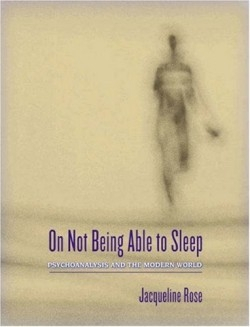On Not Being Able to Sleep
Psychoanalysis and the Modern World
“The task of psychoanalysis is not so much to undo forgetting, but to put poetry back into the mind,” writes the author, a novelist, biographer of Sylvia Plath, professor of English at the University of London, and humane reader of Freudian texts. In addition to poetry, Rose brings moderate feminism, ethical principle, social conscience, and wide reading to the task. She ties the package together with common sense and clarity, virtues too rare among Freudians, who have multiplied in the arts while losing ground in modern psychiatry.
This book brings together a dozen of Rose’s essays from the last decade, introduced with a discussion of shame, which “relies on the art of exposure, even if exposure is what it hates most.” The essays touch on this and much else in different ways: exposure of secrets by biographers, by therapists, and by writers; the paradox of celebrities seeking fame and privacy simultaneously, i.e. disclosing too much and too little, the disclosures chosen perhaps to disguise the real. Rose is brilliantly perceptive and wisely humble at the same time—she understands how much we cannot know, a position drawn in part from analyst Christopher Bollas, to whom she devotes the chapter “Of Knowledge and Mothers.”
Several of her subjects committed suicide: Anne Sexton, Sylvia Plath, and Virginia Wolff. Rose rightly criticizes the psychiatric missteps (including sexual scandal) revealed in Diane Middlebrook’s biography of Sexton, where “no screw is left unturned.” Poet Ted Hughes, widowed by Plath, fought against Rose’s biography, and the detailed presentation of their correspondence is remarkable. Rose warns against excessive interpretation of art in terms of the artist’s person: “you cannot deduce her life from these words and…poetry is a place, like dreaming, where the unlived as much as the lived can be explored.” Her incisive writing about the provocatively difficult Jacques Lacan (“What Makes an Analyst”) puts her in a very small group to whom both therapists and general readers are indebted.
The book closes with a section on “Modern Times” in which Rose takes on two big topics: the cult of celebrity, and the recent history of South Africa—the Truth and Reconciliation Commission and the meaning of political apathy and accountability. Jacqueline Rose, in her writing, is anything but an impersonal analyst, or a scholar out to impress an academic audience. The result is a readable, witty text full of insights and challenges for all serious readers.
Disclosure: This article is not an endorsement, but a review. The publisher of this book provided free copies of the book to have their book reviewed by a professional reviewer. No fee was paid by the publisher for this review. Foreword Reviews only recommends books that we love. Foreword Magazine, Inc. is disclosing this in accordance with the Federal Trade Commission’s 16 CFR, Part 255.

